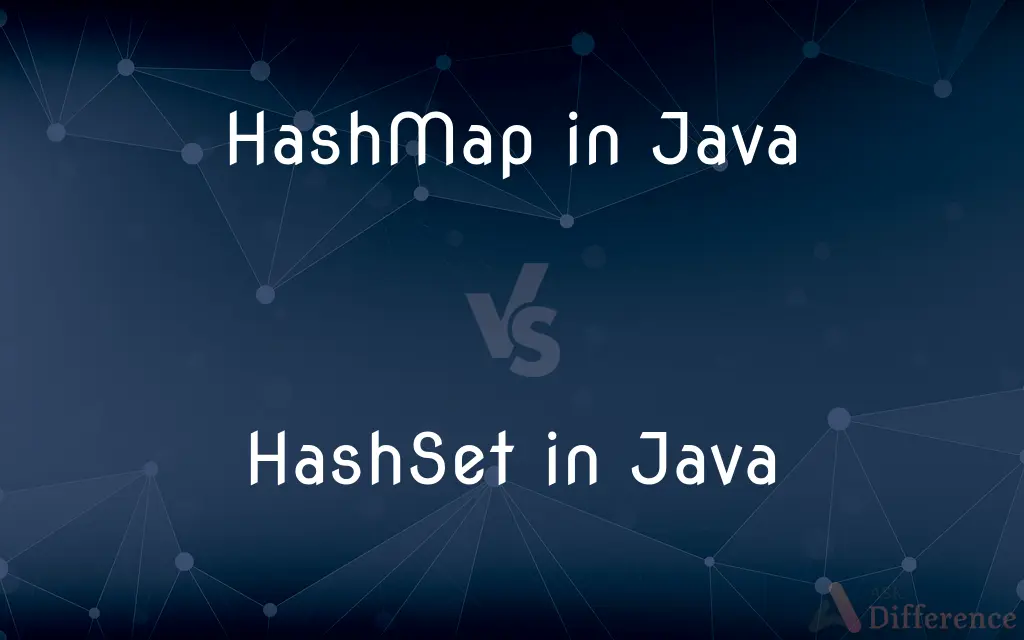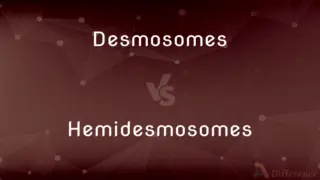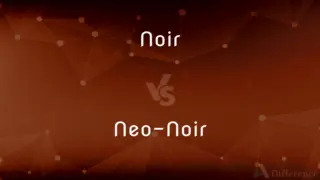HashMap in Java vs. HashSet in Java — What's the Difference?
By Tayyaba Rehman & Fiza Rafique — Published on February 2, 2024
HashMap in Java stores key-value pairs; allows duplicate values but not keys. HashSet in Java stores unique elements only, without any key-value pairing.

Difference Between HashMap in Java and HashSet in Java
Table of Contents
ADVERTISEMENT
Key Differences
HashMap in Java is a collection used to store mappings of key-value pairs. It allows rapid retrieval based on keys. HashSet in Java is a collection designed to store a set of unique elements, optimizing for quick lookups.
HashMap in Java operates on the principle of hashing, using a hash table to store the key-value pairs. HashSet in Java also uses hashing, but only stores individual objects instead of pairs.
HashMap in Java can contain one null key and multiple null values, making it versatile for various data structures. HashSet in Java can include multiple null elements, focusing on uniqueness.
HashMap in Java is ideal for scenarios where data association and retrieval by keys are required. HashSet in Java is suited for cases where the uniqueness of elements is a priority.
HashMap in Java and HashSet in Java both provide efficient data storage and retrieval but differ in their structural organization and use cases.
ADVERTISEMENT
Comparison Chart
Structure
Stores key-value pairs
Stores unique elements only
Uniqueness
Keys must be unique
All elements must be unique
Null Values
One null key, multiple null values allowed
Multiple null elements allowed
Use Case
Ideal for mappings, like dictionaries
Suitable for unique collection, like sets
Retrieval
Key-based retrieval
Direct element access
Compare with Definitions
HashMap in Java
Supports one null key and multiple null values.
Map.put(null, null); // HashMap allows null key and value
HashSet in Java
Ideal for operations on unique sets.
Set.remove(5); // Removes the element 5
HashMap in Java
Useful for data structures requiring associations.
Map.put(orange, 10); // Associates 'orange' with value 10
HashSet in Java
Allows multiple null elements.
Set.add(null); // HashSet can store null
HashMap in Java
A collection mapping unique keys to values.
HashMap<String, Integer> map = new HashMap<>();
HashSet in Java
Prohibits duplicate elements.
Set.add(5); // Duplicate elements like 5 are ignored
HashMap in Java
Utilizes hashing for storing and retrieving key-value pairs.
Map.put(apple, 5); // Stores the key 'apple' with value 5
HashSet in Java
A collection of unique elements.
HashSet<Integer> set = new HashSet<>();
HashMap in Java
Offers fast retrieval based on keys.
Int value = map.get(apple); // Retrieves value associated with 'apple'
HashSet in Java
Employs hashing for efficient data storage.
Set.add(5); // Adds the element 5
Common Curiosities
Can HashMap store duplicates?
HashMap can store duplicate values but not duplicate keys.
How does HashMap handle null values?
HashMap allows one null key and multiple null values.
Is HashMap ordered?
No, HashMap does not maintain the order of elements.
What is a HashMap in Java?
A HashMap in Java is a collection that stores data as key-value pairs for efficient retrieval.
Why use a HashMap?
Use HashMap for efficient data lookup and storage where key-value associations are needed.
How does HashSet handle null values?
HashSet allows multiple null elements.
What is a HashSet in Java?
HashSet is a collection in Java that stores a set of unique elements.
How is a HashSet implemented in Java?
HashSet is internally implemented using a HashMap in Java.
What are the performance characteristics of HashMap?
HashMap offers constant time performance for basic operations like add, remove, and get, assuming the hash function disperses elements properly.
What are the performance characteristics of HashSet?
HashSet also provides constant time performance for basic operations, contingent on the hash function.
Can HashSet store duplicate elements?
No, HashSet does not allow duplicate elements.
Is HashSet ordered?
No, HashSet does not guarantee the order of its elements.
Why use HashSet?
Use HashSet when you need a collection of unique elements without duplicates.
Can I use custom objects as keys in HashMap?
Yes, but you must override the equals() and hashCode() methods for consistent behavior.
Are HashMap and HashSet synchronized?
No, both HashMap and HashSet are not synchronized, but can be wrapped with Collections.synchronizedMap() and Collections.synchronizedSet(), respectively, for thread-safe operations.
Share Your Discovery

Previous Comparison
Desmosomes vs. Hemidesmosomes
Next Comparison
Noir vs. Neo-NoirAuthor Spotlight
Written by
Tayyaba RehmanTayyaba Rehman is a distinguished writer, currently serving as a primary contributor to askdifference.com. As a researcher in semantics and etymology, Tayyaba's passion for the complexity of languages and their distinctions has found a perfect home on the platform. Tayyaba delves into the intricacies of language, distinguishing between commonly confused words and phrases, thereby providing clarity for readers worldwide.
Co-written by
Fiza RafiqueFiza Rafique is a skilled content writer at AskDifference.com, where she meticulously refines and enhances written pieces. Drawing from her vast editorial expertise, Fiza ensures clarity, accuracy, and precision in every article. Passionate about language, she continually seeks to elevate the quality of content for readers worldwide.
















































